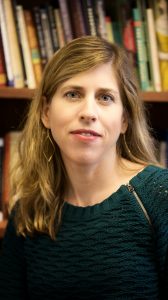
Caroline Wigginton will begin her ACLS fellowship in July. Submitted photo
OXFORD, Miss. – The American Council of Learned Societies awarded a 2017 fellowship to Caroline Wigginton, assistant professor of English at the University of Mississippi.
Wigginton is among 71 recipients chosen from nearly 1,200 applicants in the national competition, open to scholars from the humanities and related social sciences. She will begin her fellowship July 1 from Oxford and will work on her second monograph, titled “Indigenuity: Native Craftwork and the Material of Early American Books.”
One of the university’s most accomplished young professors, she has already completed one monograph and is deeply involved in research on her second book, said Ivo Kamps, UM chair of English.
“The highly competitive ACLS Fellowship will give her a year of uninterrupted research and writing, and puts her on a path to make good progress on her next book-length project,” Kamps said. “The English department’s Ph.D. program shot up 16 spots to No. 40 among public universities in 2017 U.S. News & World Report’s national rankings, and the innovative work done by Professor Wigginton and her colleagues is a big reason for that.”
Wigginton said the fellowship, valued at $40,000, means her research is important to other scholars and worthy of support. Additionally, the ACLS designated her as the first Carl and Betty Pforzheimer Fellow, named after philanthropists and activists for the humanities.
“I’m pleased to have their names attached to my fellowship,” she said. “I see my teaching and research as emphasizing the importance of understanding our histories and cultures and, as an educator, producing creative and critical readers and thinkers.”
Wigginton has spent most of her time conducting research in special collections and archives around the country, including Huntington Library in San Marino, California, Newberry Library in Chicago and Winterthur Museum in Delaware. She plans to spend the bulk of her yearlong fellowship writing the book and presenting her research at conferences.
“The fellowship provides me with the ability do research full time while also staying based in Oxford,” she said. “I love teaching and value service, the other two components of my professorship, but I’m excited about being able to devote myself to writing this book during the next academic year.”
Her research traces how early American books appropriated and propagated Native American knowledge about indigenous natural resources. Wigginton analyzes both Native and Euro-American artifacts along with travel narratives to argue that Native knowledge is present in the material of early American books.
“Here, the material of books is taken to be both imaginative and physical,” she said. “In other words, books are both repositories of instruction and also – in their incorporation of natural dyes, plant fibers and bespoke bindings – examples of that instruction being put to use.
“Still connected in their materiality to their Native roots, early American books retain indigeneity and are coextensive with a Native archive of texts and artifacts.”